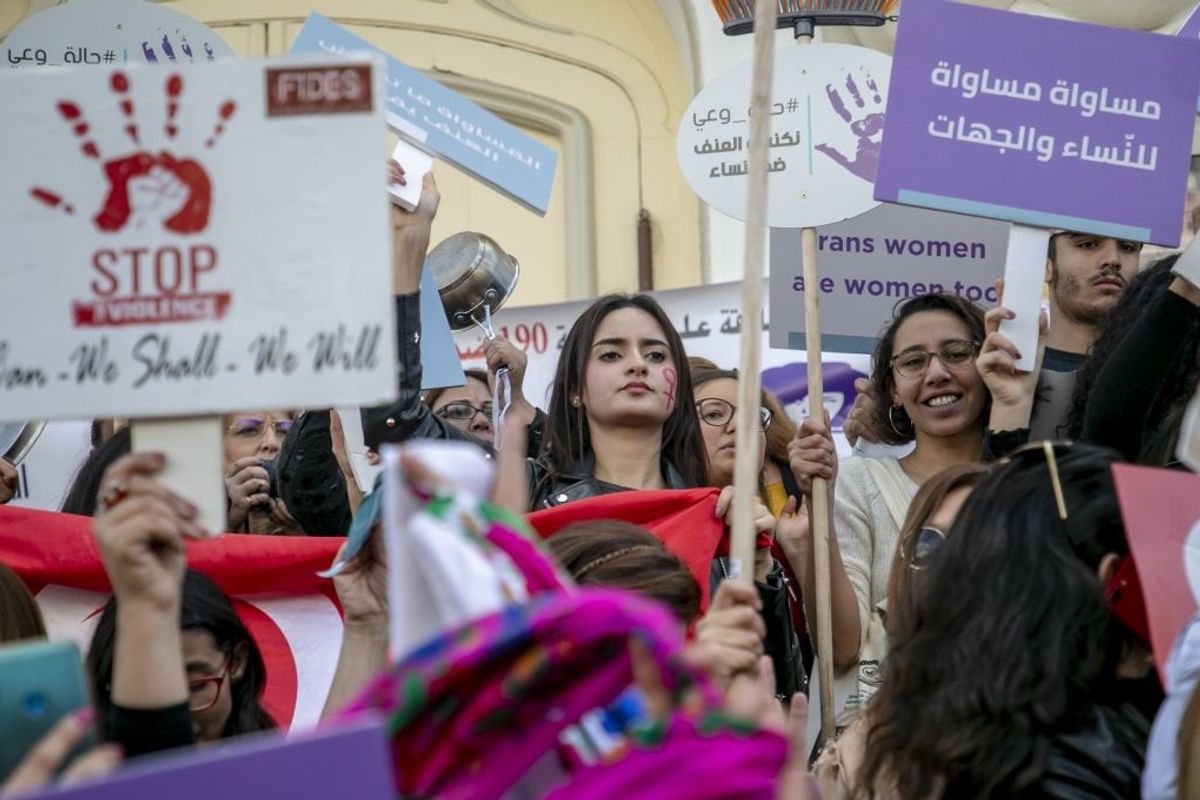Tunisian Women March Against Gender-Based Violence Under the #EnaZeda Movement
The march comes after a newly-elected politician was allegedly seen on video masturbating outside of a school.

This past Saturday, hundreds of Tunisian women took to the streets of Tunis in protest against gender-based violence in the country, according to the BBC. Under the banner of #EnaZeda, the Arabic translation of the #MeToo movement, the women urged the government to exercise political will in ending violence against women and carried brooms to symbolize the "sweeping away" of gender-based violence. The march comes after a video and images emerged which allegedly showed the newly-elected member of parliament, Zouheir Makhlouf, masturbating outside of a school in October.
Saturday's march was reportedly organized by at least 50 local NGOs including the Tunisian Association of Democratic Women (ATFD). Although Makhlouf has since denied the allegations against him citing that he was urinating in a bottle as a result of his diabetic condition, the #EnaZeda movement has grown in numbers and allowed Tunisian women to share their personal experiences and accounts of having survived being abused while challenging so-called taboos online.
In July of 2017, Tunisia passed its first national law to end violence against women—a historic moment for Tunisian women. Naziha Labidi, the Minister of Women, Family and Childhood commented on the law saying that, "As a Tunisian woman, I am very proud that this law has been adopted. This is the climax of the steps that began through the adoption of the Code of Personal Status in 1956."
Additionally, numerous accounts of children being sexually harassed by family members continue to emerge. The Jerusalem Post reports that lawyer Fadoua Brahem points out that the country's nonchalant culture with regards to addressing child abuse is part of the problem. "In Tunisia, the sanctity of a child's body is not respected," Brahem says. She adds that, "A victim needs to have the psychological and financial tools to seek justice–it's not set up to be available to everyone."
- Ugandan Activist, Stella Nyanzi, Found Guilty of Cyber Harassment ... ›
- This Afro-Brazilian Activist Has Become the First Transgender ... ›
- Prominent Somali Activist Almaas Elman Shot and Killed In ... ›
- South Africa Begins its 16 Days of Activism Campaign - OkayAfrica ›
- #JusticeForUwa, Nigerians Demand Answers for Student Killed in Church - OkayAfrica ›
- #JusticeForTshegoPule, South Africa's Femicide Crisis Claims Another Life - OkayAfrica ›
- #JusticeForTshegoPule, South Africa's Femicide Crisis Claims Another Life - OkayAfrica ›
- 'Stop Killing Us': A Visual Short Story of Gender-Based Violence and Femicide - OkayAfrica ›
- Nigerian Police Drop D'banj Rape Case - OkayAfrica ›
- Liberia Officially Declares Rape a National Emergency - OkayAfrica ›
- Tunisian President Calls for Death Penalty Following Murder of Young Woman - OkayAfrica ›
- #ShutItDown: Ongoing Namibian Protests Call for End to Gender-Based Violence - OkayAfrica ›
- Namibia Announces Special Sexual and Gender-Based Violence Court in Response to #ShutItDown Protests - OkayAfrica ›
- Lady Zamar Officially Opens Rape Case Against Sjava - OkayAfrica ›
- Kenyan Women Fight Street Harassment Using 'Chalk Back' - OkayAfrica ›
- In Honor of Slain Olympian, Family and Friends Open Center for Gender-Based Violence Survivors in Kenya - Okayplayer ›
- #JusticeForHeaven: Brutal Rape and Murder of 7-Year-Old Sparks National Outcry in Ethiopia - Okayplayer ›
- The Unchecked Violence Against Women Across East Africa - Okayplayer ›
- Ayra Starr, Simi, Join Call for Justice Over Nigerian Student’s Murder - Okayplayer ›
- New Report Underlines Need for Stricter Laws Against GBV in Africa - Okayplayer ›
- Kenyan Women Marching for #EndFemicide Met With Police Violence | OkayAfrica ›
- A 7-Year-Old's Alleged Rape Case Has Reignited GBV Protests in South Africa | OkayAfrica ›

